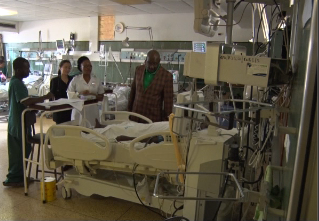Health literacy changes lives in Goromonzi
March 5, 2015 in News
HEALTH literacy has helped improve standards of health in the Chikwaka rural area in Goromonzi district where community health workers (CHWs) are playing a leading role in encouraging locals to embrace best health care practices.
By Caiphas Chimhete
As a result of health literacy offered by CHWs such as villages health workers (VHWs), health literacy facilitators (HLFs) and health centre committees (HCCs), community participation in health programmes has also increased in the area.
Even the relationship between the community and staff at Mwanza rural health centre has greatly improved leading to an upsurge of the number of people seeking health services at the clinic.The clinic now attends to between 500 and 650 patients per month up from an average of 350 patients per month two years ago.
Unlike before, pregnant mothers now prefer to give birth at the health centre.
The local community, with the help from the Community Working Group on Health (CWGH), is currently building a waiting mothers’ shelter at the clinic to ensure that pregnant women nearing full term from the catchment can stay at the home while waiting to give birthin a clean and safe environment with aid of a skilled birth attendant.
The Mwanza Clinic waiting mothers’ home, an initiative of the community, is expected to open its doors to pregnant women this year.
Mwanza Clinic nurse-in-charge, Francis Nyakani said home deliveries in the area had significantly gone down as a direct result of intensive sensitisation efforts by CHWs on the importance of giving birth at a health centre. Presently, the clinic handles about 24 deliveries up from average of 15 deliveries per month two years ago.
“There has been a big improvement on health seeking behavior because of sensitisation efforts by community health workers,” said Nyakani. “Most women are now informed about the importance of delivering at a health centre and we give credit to our HCC members.”
He added that people living with HIV/Aids were no longer afraid of revealing their status because the community now treats the disease like any other illness.
“People living with HIV speak openly about their status in this community and they also have forums where they teach others about the importance of things like abstinence and protection,” he said.
Goromonzi is one of the districts where CWGH and Save the Children in partnership with the Ministry of Health and Child Care are implementing the three-year Strengthening Community Participation in Health programme.
The programme, which is being implemented in eight provinces in Zimbabwe, is designed to strengthen community participation in health for improved Maternal, Neonatal and Child Health (MNCH) outcomes by raising community’s awareness about their health entitlements.
“It is now easy to address our problems as a community because we were trained as HCC members starting in 2010 by CWGH,” said Mwanza Clinic HCC chairman Everisto Mupambawatye. “Ican safely say we have successful changed the people’s mindset in the surrounding communities. Pregnant mothers used to shun this clinic preferring to deliver at home but not now. Every pregnant mother is coming here.”
Most members of the community can make salt and sugar solution, they fetch water for drinking from safe sources such as boreholes, they have pit toilets at their homesand they are also aware of the “three delays”.
These are the delay in deciding to seek care, the delay in reaching a health facility and the delay in receiving appropriate care.
“Here pregnant women are registering before three months because we taught them the importance of doing so and we continue to encourage them to follow all the necessary steps until even after birth,” said Anna Takaendesa, chairperson of CWGH in Chikwaka. “Very soon pregnant women will come and wait to delivery in the waiting mothers’ shelter built by the community.”
However, the country’s maternal and child mortality rates remain worrying.
It is estimated that 10 women and 100 children die every day due to largely preventable causes. Health experts say lack of information and awareness on maternal and child also contribute to the deaths.
Mupambawatye said religious objectors still remain an impediment as they discourage pregnant women from seeking medical attention or deliver safely at a health centre.
CWGH executive director Itai Rusike said Goromonzi was one of the districts where the people are enjoying the fruits of community participation in health.He said there was evidence that community-based approaches are effective in improving the health of individuals and communities at large.
“The state of primary health care has greatly improved here as direct result of community participation and health education. People here value their health,” Rusike told a meeting of HCC members at Mwanza Clinic recently.
The concept of community participation is increasingly being recognised as essential for realising the right to health. It entails that communities are no longer inactive recipients of health care but participants in the creation of health care systems that serve their specific needs.




